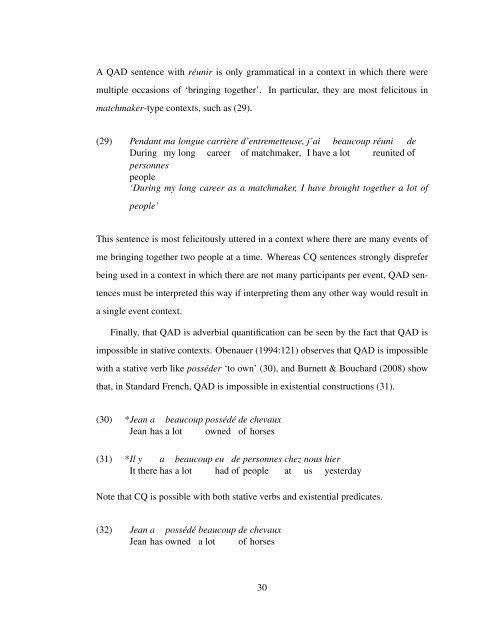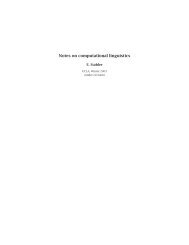Formal Approaches to Semantic Microvariation: Adverbial ...
Formal Approaches to Semantic Microvariation: Adverbial ...
Formal Approaches to Semantic Microvariation: Adverbial ...
You also want an ePaper? Increase the reach of your titles
YUMPU automatically turns print PDFs into web optimized ePapers that Google loves.
A QAD sentence with réunir is only grammatical in a context in which there were<br />
multiple occasions of ‘bringing <strong>to</strong>gether’. In particular, they are most felici<strong>to</strong>us in<br />
matchmaker-type contexts, such as (29).<br />
(29) Pendant ma<br />
During my<br />
longue<br />
long<br />
carrière<br />
career<br />
d’entremetteuse,<br />
of matchmaker,<br />
j’ai beaucoup réuni de<br />
I have a lot reunited of<br />
personnes<br />
people<br />
‘During my long career as a matchmaker, I have brought <strong>to</strong>gether a lot of<br />
people’<br />
This sentence is most felici<strong>to</strong>usly uttered in a context where there are many events of<br />
me bringing <strong>to</strong>gether two people at a time. Whereas CQ sentences strongly disprefer<br />
being used in a context in which there are not many participants per event, QAD sentences<br />
must be interpreted this way if interpreting them any other way would result in<br />
a single event context.<br />
Finally, that QAD is adverbial quantification can be seen by the fact that QAD is<br />
impossible in stative contexts. Obenauer (1994:121) observes that QAD is impossible<br />
with a stative verb like posséder ‘<strong>to</strong> own’ (30), and Burnett & Bouchard (2008) show<br />
that, in Standard French, QAD is impossible in existential constructions (31).<br />
(30) *Jean a beaucoup possédé de chevaux<br />
Jean has a lot owned of horses<br />
(31) *Il y a beaucoup eu de personnes chez nous hier<br />
It there has a lot had of people at us yesterday<br />
Note that CQ is possible with both stative verbs and existential predicates.<br />
(32) Jean a possédé beaucoup de chevaux<br />
Jean has owned a lot of horses<br />
30
















